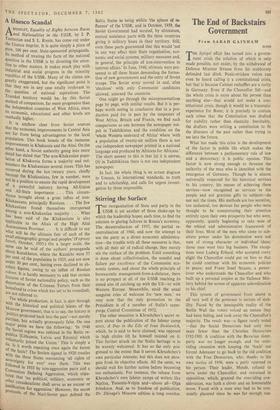A Unesco Scandal
A BOOKLET, Equality of Rights between Races and Nationalities in the USSR, by I. P. Tsamerian and S. L. Ronin, has come out under the Unesco imprint. It is quite simply a piece of Pure, 100 per cent. State-sponsored propaganda. Its method of treating the facts of the national question in the USSR is by diverting the atten- tion to other matters. It makes much play with industrial and social progress in the minority republics of the USSR. Many of the claims are greatly exaggerated, but the significant point is that they are in any case totally irrelevant to the question of national aspirations. The Transkei territory would be, by this Soviet method of comparison, far more progressive than the independent countries of West Africa, since its economic, educational and other levels are markedly higher.
It is anyhow clear from Soviet sources that the economic improvements in Central Asia are far from being advantageous to the local Population. This book boasts of the immense Improvements in Khakassia and the Altai. On the other hand, a Soviet authority going into more detail has staled that 'The non-Khakassian popu- lation of Khakassia forms a majority and out- numbers the Khakassians several times. This has occurred during the last twenty years, chiefly because the Khakassians, few in number, were not in a position to ensure the rapid development of a powerful industry having All-Union and All-State importance. . . . This circum- stance brought about a great influx of non- Khakassians, principally Russians. . • . The few Khakassians found themselves interspersed among a non-Khakassian majority. . . . What has been said of the Khakassians is also applicable to the Altais of the High Altai Autonomous Province. . . It is difficult to say what will be the ultimate fate of each of the small ethnographic groups and peoples.' (Voprosy 151'9rii, October, 1955.) On a larger scale, the same can be said of the authors' propaganda about Kazakhstan, where the Kazakhs were 57 Per cent. of the population in 1923, and are now under 30 per cent., having even declined in ab- solute figures, owing to an influx of Russian colons. It is hardly necessary to add that certain features of Soviet nationality policy, such as the deportation of the Crimean Tartars from their homeland (a crime which has yet to be remedied), are not referred to. The whole production, in fact, is shot through with the historical and political biases of the 'Moscow government; that is to say, the history is Polities projected back into the past'—not merely Partisan, but actually grotesquely false. On one major point we have the following: 'In 1940 the Soviet regime was restored in the Baltic re- publics [Lithuania, Latvia and Estonia] which voluntarily joined the Union.' This is simply a lie. Is it worth repeating once again the barest of the facts? The Soviets signed in 1920 treaties with the three States renouncing ball rights of sovereignty for ever' over them. This was followed in 1933 by non-aggression pacts and a Convention Defining Aggression, which stipu- lated that `no political, military, economic or other considerations shall serve as an excuse or Justification for aggression.' However, the secret protocols of the Nazi-Soviet pact defined the Baltic States as being within 'the sphere of in- fluence' of the USSR, and in October, 1939, the Soviet Government had secured, by ultimatums mutual assistance pacts with the three countries giving it military bases in their territory. Still, even these pacts guaranteed that this would 'not in any way affect their State organisation, eco- nomic and social systems, military measures and, in general, the principle of non-intervention in internal affairs.' In June, 1940, ultimata were pre- sented to all three States demanding the forma- tion of new governments and the entry of Soviet troops. The Soviet army moved in and, after `elections' with only Communist candidates allowed, annexed the countries.
One' might go through the misrepresentations page by page, with similar results. But it is per- haps worth noting in conclusion that in a pro- duction paid for in part by the taxpayers of West Africa, Britain and France, we find such comparisons as one between the newspaper out- put in Tadzhikistan and the condition on the `whole Western seaboard of Africa' where 'with a. population of twenty-six million there is not one independent newspaper printed in a national language and produced by Africans for Africans.' The short answer to this is that (a) it is untrue, (b) in Tadzhikistan there is not one independent newspaper.
In fact, the whole thing is an arrant disgrace to Unesco, to international standards, to truth and to scholarship, and calls for urgent investi- gation by those responsible.






































 Previous page
Previous page